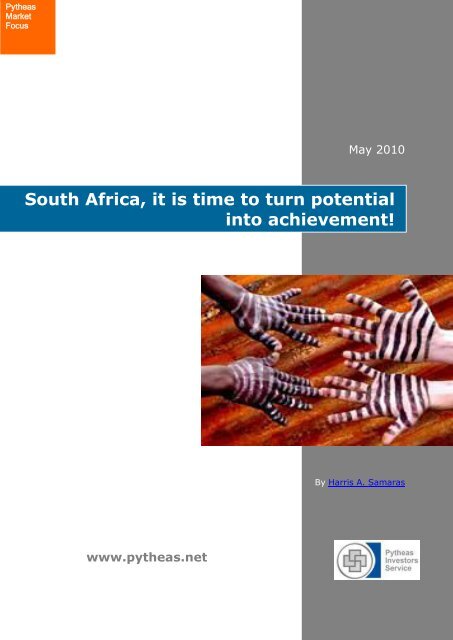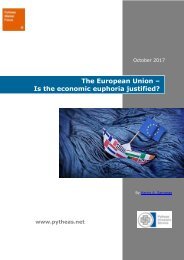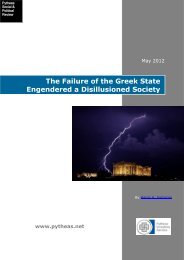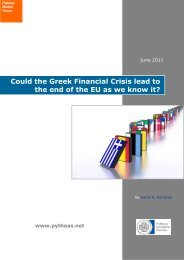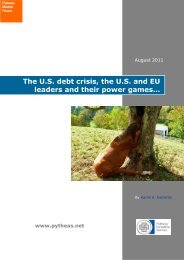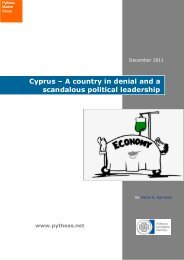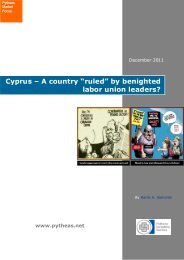South Africa, it is time to turn potential into achievement!
Can this African nation that won the admiration of the world for its peaceful transition to democracy after generations of white supremacy rule conquer the bitter divisions of its past to turn itself into the biggest mover and shaker of the African continent? Or will it become even more admired in foul governance, racial tension, poverty, corruption, violence and decay to turn into yet “another” African state? South Africa is a land of contrasts! It has immense mineral wealth, with 90% of the world’s known platinum reserves, 80% of its manganese, 70% of its chrome and 40% of its gold, as well as rich coal deposits; yet 43% of its population live on less than €3 a day. It has sky-high unemployment yet at the same time suffers from crippling, basic skills shortages. It was the first country to perform a heart transplant, yet its people’s health record is among the world’s worst. And, leaving aside war zones, it is one of the most violent and crime-ridden countries on the planet. Ignoring South Africa (and Africa) today is like failing to invest in emerging markets in the 1990s, in south-east Asia in the 1970s and 1980s or in Japan in the 1950s!
Can this African nation that won the admiration of the world for its peaceful transition to democracy after generations of white supremacy rule conquer the bitter divisions of its past to turn itself into the biggest mover and shaker of the African continent? Or will it become even more admired in foul governance, racial tension, poverty, corruption, violence and decay to turn into yet “another” African state?
South Africa is a land of contrasts! It has immense mineral wealth, with 90% of the world’s known platinum reserves, 80% of its manganese, 70% of its chrome and 40% of its gold, as well as rich coal deposits; yet 43% of its population live on less than €3 a day. It has sky-high unemployment yet at the same time suffers from crippling, basic skills shortages. It was the first country to perform a heart transplant, yet its people’s health record is among the world’s worst. And, leaving aside war zones, it is one of the most violent and crime-ridden countries on the planet.
Ignoring South Africa (and Africa) today is like failing to invest in emerging markets in the 1990s, in south-east Asia in the 1970s and 1980s or in Japan in the 1950s!
You also want an ePaper? Increase the reach of your titles
YUMPU automatically turns print PDFs into web optimized ePapers that Google loves.
Pytheas<br />
Market<br />
Focus<br />
May 2010<br />
<strong>South</strong> <strong>Africa</strong>, <strong>it</strong> <strong>is</strong> <strong>time</strong> <strong>to</strong> <strong>turn</strong> <strong>potential</strong><br />
in<strong>to</strong> <strong>achievement</strong>!<br />
By Harr<strong>is</strong> A. Samaras<br />
www.pytheas.net
Can th<strong>is</strong> <strong>Africa</strong>n nation that won the admiration of the world for <strong>it</strong>s peaceful trans<strong>it</strong>ion <strong>to</strong><br />
democracy after generations of wh<strong>it</strong>e supremacy rule conquer the b<strong>it</strong>ter div<strong>is</strong>ions of <strong>it</strong>s past <strong>to</strong><br />
<strong>turn</strong> <strong>it</strong>self in<strong>to</strong> the biggest mover and shaker of the <strong>Africa</strong>n continent? Or will <strong>it</strong> become even<br />
more admired in foul governance, racial tension, poverty, corruption, violence and decay <strong>to</strong><br />
<strong>turn</strong> in<strong>to</strong> yet “another” <strong>Africa</strong>n state?<br />
<strong>South</strong> <strong>Africa</strong>, a country synonymous <strong>to</strong> oxymoron and ant<strong>it</strong>hes<strong>is</strong>?!<br />
<strong>South</strong> <strong>Africa</strong> <strong>is</strong> a land of contrasts! It has immense mineral wealth, w<strong>it</strong>h 90% of the<br />
world’s known platinum reserves, 80% of <strong>it</strong>s manganese, 70% of <strong>it</strong>s chrome and<br />
40% of <strong>it</strong>s gold, as well as rich coal depos<strong>it</strong>s;<br />
yet 43% of <strong>it</strong>s population live on less than €3<br />
a day. It has sky-high unemployment yet at<br />
the same <strong>time</strong> suffers from crippling, basic<br />
skills shortages. It was the first country <strong>to</strong><br />
perform a heart transplant, yet <strong>it</strong>s people’s<br />
health record <strong>is</strong> among the world’s worst.<br />
And, leaving aside war zones, <strong>it</strong> <strong>is</strong> one of the<br />
most violent and crime-ridden countries on<br />
the planet.<br />
Although w<strong>it</strong>h a reasonably modern and well<br />
developed transport infrastructure; a road system<br />
that <strong>is</strong> extensive and in relatively good cond<strong>it</strong>ion;<br />
air and rail networks that are the largest on the<br />
continent and seaports that provide a natural<br />
s<strong>to</strong>pover for shipping <strong>to</strong> and from Europe, the<br />
Americas, Asia, Australasia and both coasts of<br />
<strong>Africa</strong>, the vast major<strong>it</strong>y of black <strong>South</strong> <strong>Africa</strong>ns<br />
does not own a car or dream of owning a car.<br />
In real<strong>it</strong>y <strong>South</strong> <strong>Africa</strong> <strong>is</strong> no more than a middle-income country w<strong>it</strong>h a GDP per cap<strong>it</strong>a of<br />
around US$10,000. On a per-head bas<strong>is</strong> <strong>it</strong> <strong>is</strong> the seventh richest country in <strong>Africa</strong> by some<br />
measures but th<strong>is</strong> average hides huge d<strong>is</strong>par<strong>it</strong>ies. Although most wh<strong>it</strong>e <strong>South</strong> <strong>Africa</strong>ns have<br />
done rather better than most of their black compatriots since apartheid ended, enjoying a<br />
better life, helped by cheap domestic help and first-class private medical and schools many<br />
now complain about falling standards. Most blacks still live in shacks w<strong>it</strong>hout proper<br />
san<strong>it</strong>ation in poor crime-ridden <strong>to</strong>wnships outside the main c<strong>it</strong>ies. Their schools and<br />
hosp<strong>it</strong>als are often in d<strong>is</strong>mal state. Although <strong>it</strong> has the world’s 24 th biggest<br />
economy, <strong>South</strong> <strong>Africa</strong> ranks a d<strong>is</strong>mal 129th out of 182 on the UN’s Human<br />
Development Index.<br />
When the <strong>Africa</strong>n National Congress (ANC) <strong>to</strong>ok over in 1994, <strong>it</strong> inher<strong>it</strong>ed an economy that<br />
was virtually bankrupt, following international sanctions and violent protests. Since then<br />
exports have doubled in real terms <strong>to</strong> reach $91 billion in 2008, accounting for 33% of GDP;<br />
output per person has r<strong>is</strong>en by more than a quarter, having fallen throughout the previous<br />
two decades; public debt has halved, <strong>to</strong> 23% of GDP in 2008; inflation, in double dig<strong>it</strong>s<br />
throughout the 1980s, has shrunk <strong>to</strong> 5.1%, well w<strong>it</strong>hin the government’s target range of 3-<br />
6%; and interest rates charged on bank loans are at their lowest level in nearly three<br />
decades. The economy as a whole, which had been growing by less than 1% a year in the<br />
decade up <strong>to</strong> 1994, expanded by nearly 5% a year in the five years <strong>to</strong> 2008.<br />
Not a bad record, but modest compared w<strong>it</strong>h growth rates in other emerging markets, which<br />
started from a much lower base. Last year <strong>South</strong> <strong>Africa</strong>’s economy slipped in<strong>to</strong> recession for<br />
the first <strong>time</strong> in 17 years, shrinking by 1.8%. Although most forecasters are predicting growth<br />
th<strong>is</strong> year, that <strong>is</strong> still not nearly enough <strong>to</strong> create jobs on the scale needed <strong>to</strong> absorb the<br />
legions of the unemployed.<br />
Copyright © 2010 Pytheas Lim<strong>it</strong>ed 22 May 2010 2
Officially, <strong>South</strong> <strong>Africa</strong> has an unemployment rate of 25%, the highest in the world.<br />
At <strong>it</strong>s peak, in March 2003, <strong>it</strong> reached 31%. Last year a net 870,000 jobs were lost.<br />
The racial divide <strong>is</strong> again stark: 30% of blacks are officially unemployed, compared<br />
w<strong>it</strong>h just 6% of wh<strong>it</strong>es. Fully half of those aged 15-24 are w<strong>it</strong>hout jobs. If those <strong>to</strong>o<br />
d<strong>is</strong>couraged <strong>to</strong> look for work are<br />
included, the adult unemployment<br />
rate jumps <strong>to</strong> 35%—more than one<br />
worker in three. The Bureau for<br />
Market Research thinks the true<br />
figure could be as high as 40%. And<br />
<strong>South</strong> <strong>Africa</strong> does not have a thriving<br />
informal economy where the jobless<br />
can take refuge.<br />
Many of the unskilled used <strong>to</strong> work in<br />
mining and agriculture, but both these<br />
sec<strong>to</strong>rs have been shedding jobs. Mining<br />
now accounts for a mere 2.3% of<br />
employment and 3% of GDP, down from<br />
around 14% in the 1980s. Having been<br />
the world’s biggest gold producer for more<br />
The Cape Flats, Cape Town<br />
than a century, <strong>South</strong> <strong>Africa</strong> has fallen<br />
behind China, Australia and America. Some of <strong>it</strong>s mines are nearing the end of their<br />
productive lives. But gold continues <strong>to</strong> be an important contribu<strong>to</strong>r <strong>to</strong> the economy, earning<br />
49 billion rand in foreign exchange last year. That makes <strong>it</strong> the country’s second-biggest<br />
export after platinum, where <strong>South</strong> <strong>Africa</strong> <strong>is</strong> the global leader. It <strong>is</strong> also the world’s largest<br />
producer of manganese, chrome and vanadium as well as the fourth for diamonds and fifth for<br />
coal. The world’s biggest diamond company, De Beers, <strong>is</strong> <strong>South</strong> <strong>Africa</strong>n, and two of the<br />
world’s biggest mining companies, BHP Bill<strong>it</strong>on and Anglo American, originated in <strong>South</strong><br />
<strong>Africa</strong>.<br />
Agriculture makes up 5.1% of formal jobs and a mere 2.2% of GDP. Manufacturing <strong>is</strong><br />
relatively small, providing just 13.3% of jobs and 15% of GDP. Labor costs are low, but not<br />
nearly as low as in most other emerging markets, and the cost of transport, communications<br />
and general living <strong>is</strong> much higher.<br />
Services are much the biggest part of the<br />
economy, accounting for around twothirds<br />
of GDP. The government <strong>is</strong> keen <strong>to</strong><br />
promote <strong>to</strong>ur<strong>is</strong>m, another <strong>potential</strong> source<br />
of unskilled jobs. The number of<br />
foreigners v<strong>is</strong><strong>it</strong>ing the country has leapt<br />
from 3.7mn in 1994 <strong>to</strong> nearly 10mn last<br />
year.<br />
Two decades ago <strong>South</strong> <strong>Africa</strong>n companies<br />
were largely restricted <strong>to</strong> their national<br />
base, but as trade and exchange controls<br />
were eased after 1990 they began <strong>to</strong><br />
compete internationally. Today the<br />
country has a cluster of world-class<br />
companies, such as SABMiller, a brewer;<br />
Cape Town business d<strong>is</strong>trict, a view<br />
Illovo Sugar, a low-cost sugar producer;<br />
Alexander Forbes, a r<strong>is</strong>k and benef<strong>it</strong><br />
consultant; Nampak, <strong>Africa</strong>’s biggest packaging manufacturer; Sasol, a petrochemical<br />
company; MTN, a mobile-phone opera<strong>to</strong>r; Rembrandt, a <strong>to</strong>bacco and industrial holdings<br />
group; and Investec, a financial-services firm.<br />
But in the economy, as in so much else, <strong>South</strong> <strong>Africa</strong> <strong>is</strong> a country of extremes. The World<br />
Economic Forum’s latest Global Compet<strong>it</strong>iveness Report ranks <strong>it</strong> among the <strong>to</strong>p ten (of 133<br />
countries) for the soph<strong>is</strong>tication of <strong>it</strong>s financial markets, inves<strong>to</strong>r protection, the strength of<br />
<strong>it</strong>s aud<strong>it</strong>ing and reporting standards, the efficacy of <strong>it</strong>s corporate boards, the soundness of <strong>it</strong>s<br />
banks and the regulation of <strong>it</strong>s secur<strong>it</strong>ies and exchanges. But <strong>it</strong> <strong>is</strong> among the bot<strong>to</strong>m ten for<br />
the rigid<strong>it</strong>y of <strong>it</strong>s labor market, <strong>it</strong>s mathematics and science education, the cost <strong>to</strong> business of<br />
Copyright © 2010 Pytheas Lim<strong>it</strong>ed 22 May 2010 3
crime and the availabil<strong>it</strong>y of engineers and scient<strong>is</strong>ts. Overall, <strong>it</strong> comes a middling 45th for<br />
global compet<strong>it</strong>iveness but attracts relatively low foreign direct investment.<br />
There are many reasons why the region’s leading economy, so rich in mineral resources, <strong>is</strong><br />
failing <strong>to</strong> keep up w<strong>it</strong>h other emerging markets such as India or China. First, <strong>South</strong> <strong>Africa</strong> <strong>is</strong> a<br />
relatively small country w<strong>it</strong>hout the<br />
advantage of a huge domestic cus<strong>to</strong>mer<br />
base. Although the <strong>Africa</strong>n continent<br />
contains a billion <strong>potential</strong> consumers,<br />
they are locked away in sovereign states<br />
w<strong>it</strong>h myriad different currencies,<br />
regulations and policies along w<strong>it</strong>h poor<br />
infrastructure and transport systems.<br />
D<strong>is</strong>tances are vast, making trade more<br />
difficult.<br />
Second, <strong>South</strong> <strong>Africa</strong> has for decades had<br />
an unusually low rate of saving and<br />
investment, partly because of pol<strong>it</strong>ical<br />
uncertainties. Third, <strong>it</strong> has long had an<br />
inadequate education system, resulting in<br />
an acute shortage of skilled manpower.<br />
KwaMhlanga, Pre<strong>to</strong>ria<br />
Fourth, <strong>it</strong> has a strong and volatile<br />
currency, which deters inves<strong>to</strong>rs and<br />
makes <strong>it</strong>s exports less compet<strong>it</strong>ive. Fifth, <strong>it</strong>s infrastructure, though far better than in the rest<br />
of <strong>Africa</strong>, suffers from severe bottlenecks, including power shortages, and urgently needs<br />
upgrading.<br />
When the ANC first <strong>to</strong>ok over, Eskom, the state-owned power util<strong>it</strong>y, had excess capac<strong>it</strong>y of<br />
20%. Now, because of underinvestment, m<strong>is</strong>management and rapidly expanding demand, <strong>it</strong><br />
<strong>is</strong> seriously short of generating capac<strong>it</strong>y. For the past three years <strong>South</strong> <strong>Africa</strong>ns have<br />
struggled w<strong>it</strong>h repeated power cuts and<br />
rolling blackouts. In January 2008 the<br />
entire grid came close <strong>to</strong> collapse, forcing<br />
mines and other businesses <strong>to</strong> shut down.<br />
Last year’s recession helped <strong>to</strong> ease the<br />
pressure, but shortages are likely <strong>to</strong><br />
continue at least until 2013-14, when two<br />
new clean-coal power plants are due <strong>to</strong><br />
come on stream.<br />
Eskom <strong>is</strong> now pushing ahead w<strong>it</strong>h a<br />
massive 385 billion rand expansion<br />
program. To help finance <strong>it</strong>, <strong>it</strong> has been<br />
granted perm<strong>is</strong>sion <strong>to</strong> ra<strong>is</strong>e tariffs by an<br />
annual 25% th<strong>is</strong> year, next year and in<br />
2012, having already almost doubled<br />
them over the previous five years. In<br />
Pre<strong>to</strong>ria, a c<strong>it</strong>y view<br />
April the World Bank agreed <strong>to</strong> lend <strong>it</strong><br />
$3.75 billion, the bank’s first loan <strong>to</strong><br />
<strong>South</strong> <strong>Africa</strong> since 1994. But Eskom <strong>is</strong> still seeking finance of nearly 200 billion rand over the<br />
next seven years.<br />
More than ever before, <strong>South</strong> <strong>Africa</strong>’s fortunes depend on what happens in the rest of the<br />
world, particularly in India and China. Last year China over<strong>to</strong>ok America, Japan, Germany and<br />
Br<strong>it</strong>ain <strong>to</strong> become <strong>South</strong> <strong>Africa</strong>’s biggest trading partner, w<strong>it</strong>h bilateral trade reaching about<br />
120 billion rand, over ten <strong>time</strong>s what <strong>it</strong> was in 1998, when formal diplomatic relations were<br />
establ<strong>is</strong>hed. Chinese investments in <strong>South</strong> <strong>Africa</strong> <strong>to</strong>taled $7 billion over the period. <strong>South</strong><br />
<strong>Africa</strong> hopes that China, and others, will see <strong>it</strong> as the gateway <strong>to</strong> around 170mn consumers in<br />
the <strong>South</strong>ern <strong>Africa</strong> Development Commun<strong>it</strong>y (SADC), a 15-country regional group.<br />
Copyright © 2010 Pytheas Lim<strong>it</strong>ed 22 May 2010 4
As <strong>South</strong> <strong>Africa</strong> emerges from the recession, business confidence has reached a three-year<br />
high. But government debt has started r<strong>is</strong>ing sharply again and <strong>is</strong> expected <strong>to</strong> reach 40% of<br />
GDP by 2013, nearly double <strong>it</strong>s level in<br />
2008, as the government keeps spending<br />
on education, welfare, service delivery<br />
and cutting crime.<br />
Land reform <strong>is</strong> another high-minded<br />
black-empowerment project that has<br />
gone awry. Under the 1913 Land Act<br />
blacks were not allowed <strong>to</strong> own, or even<br />
rent, land outside special black reserves.<br />
By 1994 some 87% of agricultural land<br />
was in wh<strong>it</strong>e hands. The new black<br />
major<strong>it</strong>y promptly announced plans <strong>to</strong><br />
red<strong>is</strong>tribute 30% of wh<strong>it</strong>e-owned land <strong>to</strong><br />
poor blacks w<strong>it</strong>hin five years. Th<strong>is</strong> was <strong>to</strong><br />
be acquired by the state on a “willing<br />
seller, willing buyer” bas<strong>is</strong>, at a “fair”<br />
Sowe<strong>to</strong> <strong>to</strong>wnship, Johannesburg<br />
market price. So far, barely 6% has been<br />
handed over, and the government has<br />
already run out of money. Many of the new owners have ne<strong>it</strong>her the skills nor the funds <strong>to</strong><br />
run big farms, so fertile land often lies fallow. Add<strong>it</strong>ionally the great major<strong>it</strong>y of black <strong>South</strong><br />
<strong>Africa</strong>ns do not want <strong>to</strong> become farmers.<br />
According <strong>to</strong> a survey by the Centre for Development and Enterpr<strong>is</strong>e in 2006, only 9% of<br />
black non-farmers have clear aspirations <strong>to</strong> farm. Only 2% identified rural land as a prior<strong>it</strong>y.<br />
And although less than 6% of agricultural<br />
land has been transferred <strong>to</strong> black <strong>South</strong><br />
<strong>Africa</strong>ns in terms of government schemes,<br />
more than 25 million hectares are e<strong>it</strong>her<br />
owned by the government or are in the<br />
former homelands. Private non-recorded<br />
land sales might have transferred as<br />
much as 7% of agricultural land <strong>to</strong> black<br />
owners. By the end of 2009, 29% of<br />
red<strong>is</strong>tributed farms had failed and 22%<br />
experienced declining productiv<strong>it</strong>y. One of<br />
the main causes of the failures was the<br />
inabil<strong>it</strong>y of the government <strong>to</strong> provide the<br />
necessary support and ass<strong>is</strong>tance. <strong>South</strong><br />
<strong>Africa</strong> urgently needs successful and<br />
sustainable land reform, <strong>it</strong> could<br />
otherw<strong>is</strong>e head for a s<strong>it</strong>uation that <strong>it</strong><br />
A view of Sand<strong>to</strong>n, Johannesburg<br />
could be no much different than that<br />
of <strong>it</strong>s Zimbabwe neighbor.<br />
Media horror s<strong>to</strong>ries about dirty and overcrowded hosp<strong>it</strong>als, long wa<strong>it</strong>ing <strong>time</strong>s, lack<br />
of medicine and a shortage of medical staff transform many <strong>South</strong> <strong>Africa</strong>n hosp<strong>it</strong>als<br />
in<strong>to</strong> death traps; although the government <strong>is</strong> injecting over 100 billion rand in<strong>to</strong> the system<br />
th<strong>is</strong> year, which amounts <strong>to</strong> 12% of <strong>it</strong>s budget and 3.7% of GDP. The main problem <strong>is</strong> once<br />
again an acute shortage of qualified staff. Many thousands of public-sec<strong>to</strong>r doc<strong>to</strong>rs, nurses<br />
and other medical pract<strong>it</strong>ioners have left the country, fed up w<strong>it</strong>h the poor pay and appalling<br />
cond<strong>it</strong>ions. Others have gone in<strong>to</strong> the rapidly expanding private sec<strong>to</strong>r. Studies in 2007 found<br />
that one-third of public medical posts were unfilled. In some hosp<strong>it</strong>als the vacancy rate for<br />
nurses <strong>is</strong> as high as 60%. The public sec<strong>to</strong>r now has just one doc<strong>to</strong>r for every 4,570<br />
inhab<strong>it</strong>ants, against one for every 600 in private medicine. For special<strong>is</strong>ts the d<strong>is</strong>par<strong>it</strong>y <strong>is</strong> even<br />
greater.<br />
Red tape and lumbering bureaucracies are v<strong>is</strong>ible at all governmental levels,<br />
undercutting productiv<strong>it</strong>y, encouraging commerce outside the formal sec<strong>to</strong>r and<br />
fuelling corruption. Purposeless foreign exchange controls are annoying <strong>to</strong> the<br />
extent of harassment… The judicial system <strong>is</strong> slow, and race laws and unclear<br />
Copyright © 2010 Pytheas Lim<strong>it</strong>ed 22 May 2010 5
egulations hinder investment. Lack of awareness of what <strong>is</strong> called the ―costs of<br />
compliance‖’ – costs incurred in meeting regula<strong>to</strong>ry requirements are immense.<br />
Import and export restrictions, services market barriers, import and export perm<strong>it</strong><br />
requirements, burdensome technical standards, non-transparent government procurement<br />
procedures, weak enforcement of intellectual property rights, incons<strong>is</strong>tent cus<strong>to</strong>ms<br />
admin<strong>is</strong>tration, and corruption add <strong>to</strong> the cost of trade.<br />
According <strong>to</strong> the 2010 Index of Economic Freedom, the overall freedom <strong>to</strong> start, operate, and<br />
close a business <strong>is</strong> relatively well protected under <strong>South</strong> <strong>Africa</strong>’s regula<strong>to</strong>ry environment;<br />
starting a business takes 22 days, compared <strong>to</strong> the world average of 35 days. But <strong>is</strong> th<strong>is</strong> good<br />
enough? Is th<strong>is</strong> <strong>is</strong>sue and all of the above d<strong>is</strong>cussed real incentives, attractive incentives for a<br />
<strong>potential</strong> inves<strong>to</strong>r? Shouldn’t the governmental machine be designed and operated in such a<br />
way <strong>to</strong> make the life of the foreign and local inves<strong>to</strong>rs easy? How can the <strong>to</strong>p income tax rate<br />
of 40% and the <strong>to</strong>p corporate tax rate of 28% ever be attractive <strong>to</strong> a foreign inves<strong>to</strong>r?<br />
Add<strong>it</strong>ionally, non-transparent regulations, rigid labor laws, and crime are d<strong>is</strong>incentives for<br />
inves<strong>to</strong>rs. Moreover, establ<strong>is</strong>hing foreign exchange accounts, most purchases of foreign<br />
exchange, payments, cap<strong>it</strong>al transactions, and transfers are subject <strong>to</strong> unnecessary<br />
restrictions, controls, and prior approval…<br />
For <strong>South</strong> <strong>Africa</strong> <strong>to</strong> prosper, pol<strong>it</strong>ical will, economic capac<strong>it</strong>y, democratic stabil<strong>it</strong>y and<br />
inst<strong>it</strong>utional capac<strong>it</strong>y need <strong>to</strong> be present. A fundamental revolution in leadership’s mental<strong>it</strong>y <strong>is</strong><br />
required. Th<strong>is</strong> would ensure that <strong>South</strong> <strong>Africa</strong>ns experience good governance, respect for<br />
human rights, development that <strong>is</strong> equ<strong>it</strong>able and sustainable. The most important qual<strong>it</strong>y<br />
that <strong>South</strong> <strong>Africa</strong>n leadership needs <strong>to</strong> embrace, and that <strong>is</strong> desperately lacking not<br />
only in <strong>South</strong> <strong>Africa</strong> but across the continent, <strong>is</strong> a sense of service <strong>to</strong> the people in<br />
whose name leaders govern. But th<strong>is</strong> revolution cannot be confined only <strong>to</strong> the<br />
ruling el<strong>it</strong>es. Even the poorest and least empowered of <strong>South</strong> <strong>Africa</strong>n c<strong>it</strong>izens need<br />
<strong>to</strong> rid themselves of a culture that <strong>to</strong>lerates systemic corruption, inefficiency and<br />
m<strong>is</strong>management of state affairs. Such a system also privileges one ethnic or socioeconomic<br />
group over another! If only <strong>South</strong> <strong>Africa</strong>n leaders invest more in education and the<br />
creation of sustainable employment options and inclusive economies, and if they are more<br />
concerned w<strong>it</strong>h the welfare of their people and not only their own direct or indirect<br />
enrichment…<br />
It <strong>is</strong> also important <strong>to</strong> note that a prosperous <strong>South</strong> <strong>Africa</strong> would set a good example of a<br />
country that has managed <strong>to</strong> reconcile and overcome ethnic div<strong>is</strong>ions, whereas a <strong>South</strong> <strong>Africa</strong><br />
that fails in th<strong>is</strong> effort would send alarming signals throughout the continent.<br />
<strong>South</strong> <strong>Africa</strong>’s <strong>potential</strong> <strong>is</strong> vast! Opportun<strong>it</strong>ies are great! And <strong>South</strong> <strong>Africa</strong> <strong>is</strong> not poor!<br />
Ignoring <strong>South</strong> <strong>Africa</strong> (and <strong>Africa</strong>) <strong>to</strong>day <strong>is</strong> like failing <strong>to</strong> invest in emerging markets in the<br />
1990s, in south-east Asia in the 1970s and 1980s or in Japan in the 1950s!<br />
Copyright © 2010 Pytheas Lim<strong>it</strong>ed 22 May 2010 6
Opinion:<br />
Sixteen years ago <strong>South</strong> <strong>Africa</strong> was a mess, economically, pol<strong>it</strong>ically and<br />
psychologically. The world treated <strong>it</strong> as a pariah. A racial conflagration seemed<br />
not only possible but likely. Since then <strong>it</strong> has come a long way, led by people who<br />
were completely new <strong>to</strong> running anything much, let alone a big, soph<strong>is</strong>ticated and<br />
highly complex country. It was inev<strong>it</strong>able that m<strong>is</strong>takes would be made. Today<br />
<strong>South</strong> <strong>Africa</strong> <strong>is</strong> a lot happier, w<strong>is</strong>er and more prosperous. It has been welcomed<br />
back in<strong>to</strong> the international commun<strong>it</strong>y, <strong>is</strong> a member of the G20 group of<br />
important countries and <strong>is</strong> the biggest mover and shaker in <strong>Africa</strong>.<br />
Today’s state, economy and social order are largely the outcome of colonization,<br />
wh<strong>it</strong>e supremacy, oppression, narrow minded and hasty policies, d<strong>is</strong>crimination<br />
and reverse d<strong>is</strong>crimination, high ill<strong>it</strong>eracy rate, tribal<strong>is</strong>m that neglects <strong>it</strong>s own<br />
children, unimaginative greed… The Afrikaner has not yet digested that the<br />
parad<strong>is</strong>e that has been created through hard work and explo<strong>it</strong>ation <strong>is</strong> no more.<br />
The Black <strong>South</strong> <strong>Africa</strong>n has not yet digested that he <strong>is</strong> free, that th<strong>is</strong> country <strong>is</strong><br />
really h<strong>is</strong> and that by robbing and raping <strong>it</strong> he only dooms himself and h<strong>is</strong><br />
children.<br />
Add<strong>it</strong>ionally the new <strong>South</strong> <strong>Africa</strong>’s relations w<strong>it</strong>h the world are often confused,<br />
almost schizophrenic, as <strong>it</strong> struggles <strong>to</strong> understand what <strong>it</strong> <strong>is</strong> and what <strong>it</strong> wants<br />
<strong>to</strong> be. On the one hand <strong>it</strong> likes <strong>to</strong> see <strong>it</strong>self as the hegemon of southern <strong>Africa</strong> and<br />
a global leader of the emerging world, along w<strong>it</strong>h China, Brazil and India. On the<br />
other hand both <strong>it</strong>s economy and <strong>it</strong>s values remain closely allied w<strong>it</strong>h those of the<br />
rich world. In <strong>Africa</strong> <strong>it</strong> <strong>is</strong> an economic giant, yet, desp<strong>it</strong>e <strong>it</strong>s black-led<br />
government, <strong>it</strong> remains a pol<strong>it</strong>ical pygmy, unable—or unwilling—<strong>to</strong> solve<br />
problems even in <strong>it</strong>s own backyard of Zimbabwe. Its foreign policy <strong>is</strong> a muddle…<br />
Freedom has yet <strong>to</strong> deliver on <strong>it</strong>s prom<strong>is</strong>e. Vast numbers of <strong>South</strong> <strong>Africa</strong>ns<br />
continue <strong>to</strong> live in grinding poverty as the rich get ever richer. Hundreds of<br />
thousands are scythed down by d<strong>is</strong>eases such as HIV/AIDS and tuberculos<strong>is</strong>.<br />
Others succumb <strong>to</strong> criminal violence or the carnage on the roads, robbing families<br />
of breadwinners and businesses of employees. The economy cries out for more<br />
skilled workers, yet millions remain unemployed and unemployable. Univers<strong>it</strong>ies<br />
dumb down their courses <strong>to</strong> boost pass rates, only <strong>to</strong> <strong>turn</strong> out graduates who are<br />
not much good <strong>to</strong> anyone. The government seeks <strong>to</strong> woo foreign inves<strong>to</strong>rs, but<br />
some of ANC’s executives send shivers down their spines by ins<strong>is</strong>ting that mines<br />
and banks will be nationalized w<strong>it</strong>hin the next few years.<br />
R<strong>is</strong>ing d<strong>is</strong>content in the poor black <strong>to</strong>wnships threatens <strong>to</strong> boil over in<strong>to</strong> renewed<br />
violence. Revolutions, as Pla<strong>to</strong> noted, tend <strong>to</strong> start w<strong>it</strong>h r<strong>is</strong>ing expectations, not<br />
when cond<strong>it</strong>ions are at their worst. Even if the government could give the jobless<br />
everything they are demanding, which <strong>it</strong> cannot, that still might not be enough.<br />
There <strong>is</strong> no doubt that social and pol<strong>it</strong>ical instabil<strong>it</strong>y, a marginal concern since<br />
1994, could become a determining fac<strong>to</strong>r in <strong>South</strong> <strong>Africa</strong>’s future. Some feel<br />
<strong>South</strong> <strong>Africa</strong> could still go e<strong>it</strong>her way, e<strong>it</strong>her gradually sliding in<strong>to</strong> a corrupt thirdworld<br />
mess or making slow progress w<strong>it</strong>hout ever fulfilling <strong>it</strong>s <strong>potential</strong>. But<br />
others remain doggedly optim<strong>is</strong>tic, desp<strong>it</strong>e the country’s obvious failings.<br />
Pytheas believes that <strong>South</strong> <strong>Africa</strong> has the prerequ<strong>is</strong><strong>it</strong>es and the <strong>potential</strong> <strong>to</strong><br />
become one of the world’s most majestic countries, prosperous and efficient. One<br />
<strong>is</strong> for sure, <strong>to</strong>day’s <strong>South</strong> <strong>Africa</strong> <strong>is</strong> not for the faint-hearted. Everything <strong>is</strong> in flux<br />
and nothing <strong>is</strong> certain. The Country requires leadership and v<strong>is</strong>ion but most of all<br />
educated c<strong>it</strong>izens that will eventually contain the greed and weaknesses of<br />
inadequate governments and negative social components.<br />
D<strong>is</strong>claimer<br />
Copyright © 2010 Pytheas Lim<strong>it</strong>ed 22 May 2010 7
The above notes have been compiled <strong>to</strong> ass<strong>is</strong>t you; however, actions taken as a result of th<strong>is</strong> document are at the d<strong>is</strong>cretion of the reader and not<br />
Pytheas Lim<strong>it</strong>ed or Harr<strong>is</strong> A. Samaras.<br />
All rights reserved. The material in th<strong>is</strong> publication may not be copied, s<strong>to</strong>red or transm<strong>it</strong>ted w<strong>it</strong>hout the prior perm<strong>is</strong>sion of the publ<strong>is</strong>hers. Short<br />
extracts may be quoted, provided the source <strong>is</strong> fully acknowledged.<br />
Copyright © 2010 Pytheas Lim<strong>it</strong>ed 22 May 2010 8


